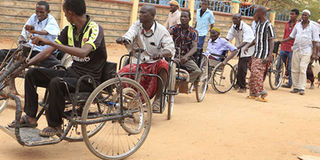Disabled at periphery of opportunities

Disabled persons in Mandera. People with disabilities are generally confronted with ranges of handicapping situations. PHOTO | FILE | NATION MEDIA GROUP
What you need to know:
- According to the government, as at March 2017 there were about 350,000 Kenyans who have been registered as disabled persons.
- People with disabilities are generally confronted with ranges of handicapping situations.
Last year the Treasury released a report showing a total of 45,045 public tenders had been awarded to local enterprises owned by youth, women and disabled persons.
Out of this 6.6 per cent or 2,956 enterprises are owned by disabled persons with women owning 25,549 and youth leading with 39,681.
This report further indicated of the Sh50.1 billion worth of tenders government awarded between 2014-2017 to the enterprises of these disadvantage groups, disabled persons’ (pwds) enterprises ‘bagged’ Sh1.3 billion (2.6 per cent), youth Sh22.2 billion and women led with Sh26.6 billion.
The report was tracking the implementation of the 30 per cent local access to government procurement opportunities (AGPO) in this period.
In 2013 President Uhuru Kenyatta directed the procurement laws be amended to allow 30 per cent of contracts to be given to the youth, women and disabled persons without competition from any quotas.
CORRUPTION
To benefit from this directive, these enterprises must be at least 70 per cent owned by youth, women and pwds with 100 per cent of all its leadership positions held by them and registered under the AGPO Program at the National Treasury to access public tender opportunities.
According to the government, as at March 2017 there were about 350,000 Kenyans who have been registered as disabled persons.
These persons can now access government services, including tax exemption for monthly earnings of Sh150,000 and below and Sh1.8 million annual income from enterprises owned by them, purchase of duty-free vehicles, free medical cover and enrolment in government cash transfer programmes.
Are the disabled accessing these opportunities? And are those accessing these schemes really disabled?
Unfortunately affirmative programmes have been pervaded by corrupt practices and is rife with allegations of nepotism and cronyism that’s diluting its good spirit.
CHALLENGES
They are many alleged cases where people are holding illegal medical examination reports and disability cards which they used to acquire tax exemption certificates, accessing AGPO and employment opportunities.
People with disabilities are generally confronted with ranges of handicapping situations and depending on the extent of their disability and locations, accessing such opportunities is a daunting task.
The AGPO process is cumbersome and expensive, many cannot even afford Sh10,000 for company registration.
Most of their enterprises lack the capacity to understand the bidding processes, lack of invoice funding to fund tenders and painful late payments after the delivery of services.
Worse again no clear cut-off quota of this 30 per cent is deliberately set aside for them.
Likewise, most of the tenders of more than Sh5 million are for construction-related businesses, while most AGPO firms are registered in the services sector, specifically trade.
That’s why in this period of this report they managed a paltry 2.6 per cent of the total tender awarded.
Hassan is an author and Social justice commentator [email protected]




